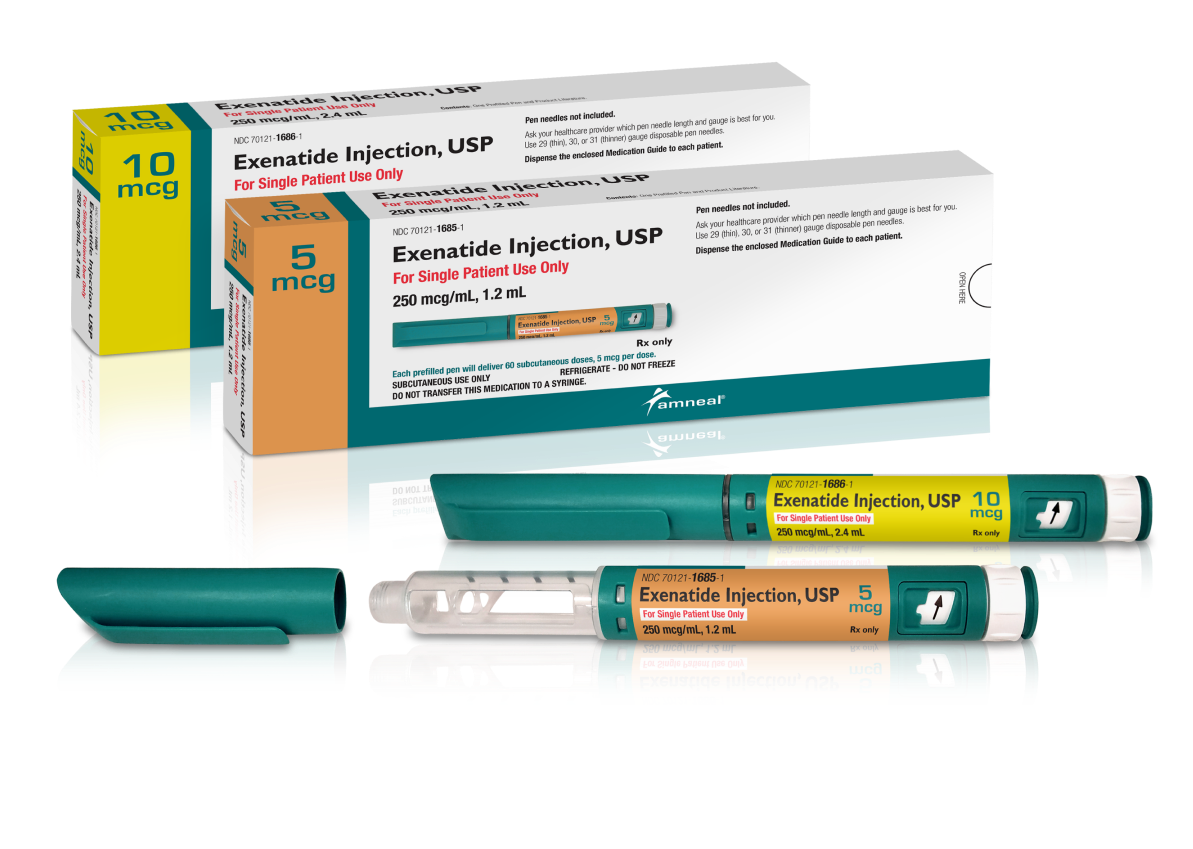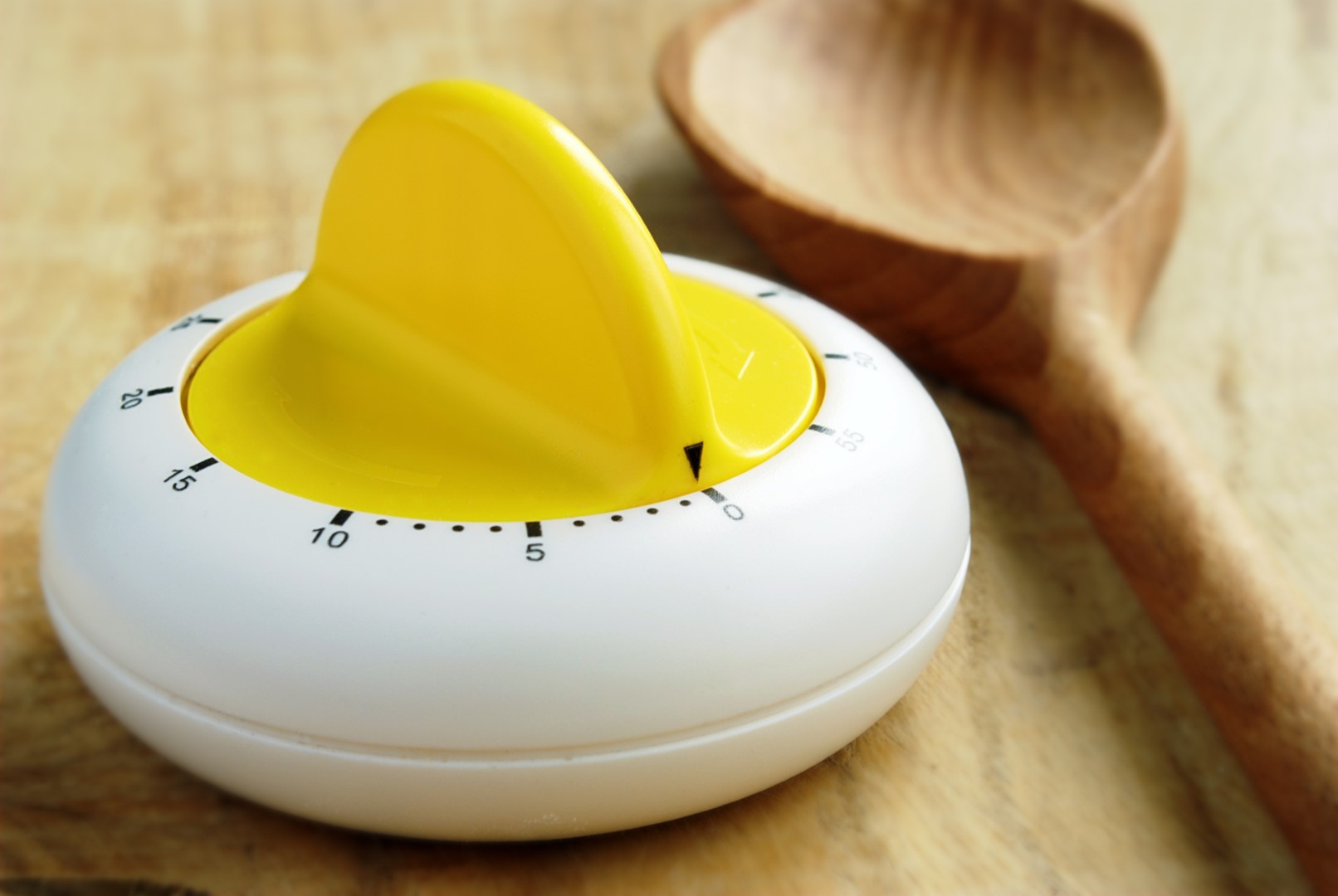The Generic
Equivalent
for Byetta®

Exenatide Injection from Amneal Pharmaceuticals
An FDA-approved generic equivalent for Byetta®
- Contains the same active ingredient
- Provides the same therapeutic effect
- Offered in the same dosage strengths

Using Exenatide Injection
The Amneal exenatide injection pen is available in 2 dose strengths: 5 micrograms (mcg) and 10 mcg. Your healthcare provider will prescribe the dose that is right for you. They should also help you learn how to inject exenatide before your first use.
Each pen contains enough medicine for 30 days.*
It is recommended that exenatide be started at 5 mcg twice daily to reduce the incidence and severity of gastrointestinal side effects. Based on your clinical response after one month of treatment, your healthcare provider may increase the dosage.
*Based on standard dosage regimen of one injection twice a day.
Instructions for Use for Exenatide Injection
Before you use the pen for the first time, please read the full Instructions for Use.
See below for resources on using the Amneal exenatide injection pen*
*This information does not replace talking with your doctor about your medical condition or your treatment .

When To Take
Exenatide is injected two times each day, at any time within 60 minutes (1 hour) before your morning and eventing meals (or before the two main meals of the day, approximately 6 hours or more apart). Do not take exenatide injection after your meal.
- If you miss a dose of exenatide, skip that dose and take your next dose at the next prescribed time. Do not take an extra dose or increase the amount of your next dose to make up for a missed dose.
- If you use too much exenatide, call your healthcare provider or poison control center at 1-800-222-1222 right away. Too much exenatide can cause your blood sugar to drop quickly, and you may have symptoms of low blood sugar. You may need medical treatment right away. Too much exenatide can also cause severe nausea and vomiting.
Remember
The Exenatide injection pen is for single patient use only.
- Do not share your injection pen with other people, even if the needle has been changed. You may give other people a serious infection, or get a serious infection from them.
- Do not reuse or share needles with another person.
- Be sure to read the Instructions for Use that comes with your injection pen for more complete instructions.
- Follow your healthcare provider’s instructions for diet, exercise, and how often to test your blood sugar. If you see your blood sugar increasing during treatment with exenatide, talk to your healthcare provider; you may need to adjust your current diabetes treatment plan.
- Talk to your healthcare provider about how to manage high blood sugar (hyperglycemia) and low blood sugar (hypoglycemia), and how to recognize problems that can happen with your diabetes.
Important Safety Information for Exenatide Injection
- Do not use exenatide injection if you have had a severe allergic reaction to exenatide or any of the other ingredients in exenatide injection. Severe allergic reactions can happen with exenatide injection. Stop taking exenatide injection and get medical help right away if you have any symptom of a severe allergic reaction. Symptoms of a severe allergic reaction with exenatide injection may include swelling of your face, lips, tongue, or throat; fainting or feeling dizzy; problems breathing or swallowing; very rapid heartbeat; and severe rash or itching.
- Do not share your exenatide injection pen with other people, even if the needle has been changed. You may give other people a serious infection or get a serious infection from them.
- Serious side effects can happen in people who take exenatide injection, including inflammation of the pancreas (pancreatitis) which may be severe and lead to death. Stop using exenatide injection and call your healthcare provider right away if you have severe pain in your stomach area (abdomen) that will not go away, with or without vomiting. You may feel the pain from your abdomen to your back. These may be symptoms of pancreatitis.
- Your risk for getting low blood sugar is higher if you take exenatide injection with another medicine that can cause low blood sugar, such as a sulfonylurea or insulin. The dose of your sulfonylurea or insulin medicine may need to be lowered while you use exenatide injection. Signs and symptoms of low blood sugar may include headache; drowsiness; weakness; hunger; fast heart beat; dizziness; confusion; anxiety, irritability, or mood change; sweating; feeling jittery; blurred vision; slurred speech.
- Tell your healthcare provider if you have or have had kidney problems or a kidney transplant. Exenatide injection may cause new or worse problems with kidney function, including kidney failure. Dialysis or kidney transplant may be needed. Call your healthcare provider right away if you have nausea, vomiting, or diarrhea that will not go away, or if you cannot take liquids by mouth. You may be at increased risk for kidney problems.
- Tell your healthcare provider if you have severe problems with your stomach, such as delayed emptying of your stomach (gastroparesis) or problems with digesting food. Other medicines like exenatide injection may cause severe stomach problems. It is not known if exenatide injection causes stomach problems or will cause your stomach problems to worsen.
- The most common side effects of exenatide injection include nausea, vomiting, diarrhea, feeling jittery, dizziness, headache, indigestion, constipation, and weakness. Nausea is most common when you first start using exenatide injection but may decrease over time.
- Before using exenatide injection, tell your healthcare provider about all the medicines you take, including prescription and over-the-counter medicines, vitamins, and herbal supplements. Exenatide injection may affect the way some medicines work and some other medicines may affect the way exenatide injection works. Tell your healthcare provider if you take other anti-diabetes medicines, especially sulfonylurea medicines or insulin, or birth control pills that are taken by mouth (oral contraceptives), an antibiotic, warfarin sodium, a blood pressure medicine, a water pill (diuretic), a pain medicine, or lovastatin. Take your birth control pills or antibiotics at least one hour before your injection of exenatide.
- Before taking exenatide injection, tell your healthcare provider if you are pregnant or plan to become pregnant or are breastfeeding or plan to breastfeed. It is not known if exenatide injection will harm your unborn baby or if exenatide passes into your breast milk
Approved Uses
Exenatide injection is indicated as an adjunct to diet and exercise to improve glycemic control in adults with type 2 diabetes mellitus.
Limitations of Use
- Exenatide injection is not indicated for use in patients with type 1 diabetes.
- Exenatide injection contains exenatide and should not be used with other products containing the active ingredient exenatide.
- Exenatide injection has not been studied in patients with a history of pancreatitis. Consider other antidiabetic therapies in patients with a history of pancreatitis.
To report SUSPECTED ADVERSE REACTIONS, contact Amneal Pharmaceuticals LLC at 1-877-835-5472 or FDA at 1-800-FDA-1088 or www.fda.gov/medwatch.
Please see full Prescribing Information and Medication Guide for Exenatide injection 5 mcg and 10 mcg.
